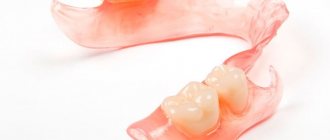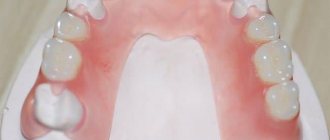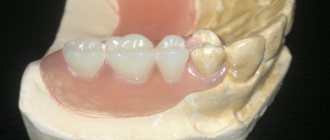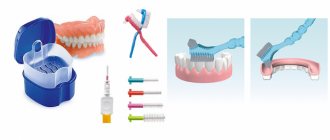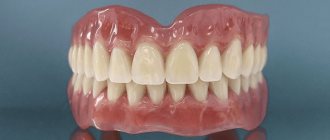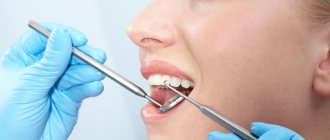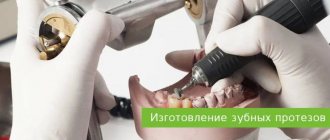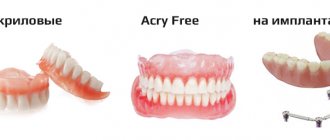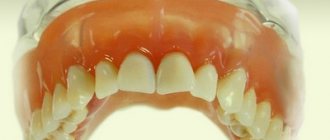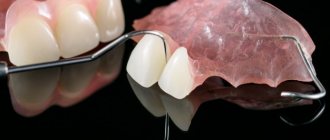06.09.2017
To fill the missing crowns of the dentition, dentists, along with implants, widely use various types of prosthetic structures that ensure the full functioning of the dentition and perfectly hide various defects. Among the many varieties of prosthetic structures, removable dentures made of nylon have recently become very popular. They are completely harmless to health, do not contain toxins and are quite comfortable to wear. These products are made using a base of nylon, a highly durable and flexible artificial polymer material. Previously, prostheses made from this material were used only as a temporary measure.
The main material for their manufacture is dental soft nylon, the structure and appearance of which are very similar to the appearance of natural teeth and gums. For this reason, the aesthetic qualities of this type of dental prosthetic structures are very high.
Flexible nylon dentures have fundamental differences from prosthetic structures made of hard plastic or metal. The hard base of plastic and metal dentures constantly rubs the gums, creating great inconvenience when talking and chewing food. Modern prosthetic structures are much softer, so they do not cause such discomfort. In addition, they have a small mass, and therefore are easily fixed in the oral cavity. In addition, some people who have completely lost teeth on one or both jaws suffer from metal allergies.
And although nylon prosthetic dental structures also have their drawbacks, which will be discussed below, the constant development of prosthetic technology leads to the appearance of new, more improved models on the market.
What are nylon dentures
The prosthetics in question is an orthodontic solution that replaces lost natural teeth in situations where it is not possible to use bridges and implants.
To create prostheses of this type, synthetic elastic polymers - nylons - are used. Using them, they create flexible, elastic, removable systems designed to replace lost teeth. The color of the material is chosen exactly to match the color of the gums.
Elasticity reduces the adaptation period, making further wearing comfortable. It usually takes about 7 days to get used to it. The structure consists of a base, directly created artificial teeth and fixing parts. The base is made of nylon. The properties of the material eliminate irritation of the mucous membrane, friction and pressure on the jaw.
Pink translucent dental nylon skillfully imitates the natural color and structure of gum tissue. The prosthesis looks quite natural. For artificial teeth, plastics of a higher quality level are most often used. Which outwardly differ little from natural ones, they imitate not only this form from nature, but also the color. Fixation elements - clasps are made of dental nylon. Therefore, even with emotional communication, the fasteners remain invisible.
Thanks to the special qualities of nylon, it is possible to obtain a fully functional prosthesis, endowed with an attractive appearance and significant resistance to mechanical damage. The product retains color when interacting with pigmenting products. However, what is most appreciated in products of this kind is the absence of irritants in the composition, which completely eliminates the occurrence of various allergic reactions during wearing.
Manufacturing process
The manufacturing process of nylon structures consists of several stages. The technique is considered very complex, so the patient will have many visits to the dentist before the prosthesis is installed.
At the first appointment, the doctor conducts a thorough diagnosis of the oral cavity. After the examination, defects are eliminated, for example, treatment or tooth extraction. For high-quality installation, oral hygiene is important, so preliminary cleaning and removal of tartar are carried out.
After the preparatory procedures, the manufacturing process begins:
- Impressions are taken from the dentition. This is necessary in order to create the correct design in accordance with individual characteristics.
- Based on the casts, a model is made in the laboratory using a wax structure.
- The resulting model undergoes fitting, during which dentists can make adjustments. The corrected model is sent back to the laboratory for corrections.
- To produce the final structure, special heat presses are used, which ensure precise shaping. The temperature during the manufacturing process reaches 250 degrees.
- The final stage is polishing the product.
Before installing the structure completely, additional fitting is performed.
Kinds
Among the variety of prostheses, they are divided into:
- partially removable;
- completely removable structures;
- conditionally removable.
Fully removable systems are most often used for complete tooth loss. They are created from individual casts, taking into account all the anatomical features and structure of the patient’s jaw.
They are made to be as comfortable as possible and the recommendation is not to take them off at all for the first time. During the test period of wear, the body gets used to it, and the doctor monitors the patient’s reaction to the prosthetics.
If necessary, the dentist makes adjustments and adjusts the design of the prosthesis, which makes wearing them more comfortable and painless. This type of removable denture looks very natural. They are made from the following materials: nylon, plastic. Please note that the structures are non-toxic and do not cause harm to health.
Conditionally removable dentures are recommended for the loss of one tooth. Such medical systems do not need to be removed before going to bed. They are attached to adjacent teeth using special cement; metal hooks and glue are also used for fastening.
Partially removable types of structures are not the most convenient. They attach to the gums and take up a lot of space in the mouth. This option is suitable for permanent wear, on a temporary basis and can replace one or more teeth. The technology is not perfect, but its financial accessibility makes it popular today.
Features of nylon
Nylon is a material that is highly biocompatible, hypoallergenic, and hygroscopic. It is indispensable for patients suffering from allergies to alloys or plastics.
The material does not absorb odors and externally allows you to recreate the natural appearance of teeth and gums. With all this, nylon has the characteristics necessary to perform the functions of dentures and maintain a high degree of comfort, namely lightness, strength and elasticity.
Distinctive features of nylon are:
- wide range of applications;
- Possibility of arrangement with other materials;
- stable fixation in the oral cavity;
- accessibility for patients;
- long service life with proper care.
During use, patients note the natural appearance of such products and high wearing comfort.
Pros and cons of nylon prostheses
Medical nylon dentures are lightweight and comfortable designs that are used both for complete and partial loss of teeth. They are strong, relatively durable, aesthetically pleasing - almost invisible to others, and make it possible to completely restore chewing function. Such prosthetics can be used if the budget is limited or implantation is not possible for medical reasons.
But it has a number of disadvantages:
- not a particularly reliable fastening, even the highest quality system “looses” over time;
- requires regular hygiene - cleaning;
- systems are significant in size;
- The term of use of a removable denture is up to 5 years.
conclusions
So, by choosing a nylon structure, you get increased aesthetics of your new teeth: they will be almost invisible in your mouth.
But it is important to remember that it is not enough to decide the type of design; you must also carefully consider the choice of the manufacturer, the clinic in which you will install it, and the doctor. Your comfort when using dentures will depend on this. To make a final decision, in any case, you need to consult with a specialist.
Well, in this video you will learn how nylon dentures are made:
If you find an error, please select a piece of text and press Ctrl+Enter.
Tags nylon dentures reviews removable dentures
Did you like the article? stay tuned
Previous article
Laser teeth whitening: reviews, prices and description of the procedure
Next article
A baby is cutting teeth: symptoms, timing and advice for mothers
Who is it suitable for?
Nylon denture systems can be installed to either recreate missing teeth or cover existing but unsightly ones. The use of prostheses is indicated in the following cases:
Products are installed if one or part of the teeth in the jaw is lost; they are installed in cases of complete edentia - the absolute absence of teeth. They are used when, for financial reasons, it is impossible for a patient to have implantation and installation of clasp types of prostheses.
Indicated when implants are prohibited from being implanted into a patient due to the presence of various diseases. Although nylon prostheses can be used even with existing diabetes, disorders of the cardiovascular system, even epilepsy and other diseases.
Nylon structures are often recommended for installation by children. They are used in situations where a baby tooth has been removed and a permanent replacement does not appear for a long time. In this case, prosthetics prevent the displacement of a number of teeth in the jaw and subsequent deformation of the bite.
Used in the presence of pathology such as periodontal disease. This untreated disease can lead to the loss of all teeth. Wearing a prosthesis is indicated only in the first and second stages of the disease.
Used for temporary prosthetics during the period of tissue adaptation during implantation.
Dentists sometimes recommend wearing them for people involved in dangerous work, a high risk of various injuries, including damage and loss of teeth: athletes, employees of the military and law enforcement agencies, and others.
Description of design
Partial or complete structures made from Valplast material are nylon-based products that are attached to the oral cavity with clasps (clamps) and rest on the surface of living teeth or the alveolar ridge to optimally distribute the load on the jaw during chewing.
Valplast material is highly aesthetic and durable. It is almost impossible to break, so the use of such prostheses is recommended for people experiencing extreme situations and being injured.
The removable nylon structure looks like a kind of “overlay” on the gums with recesses for healthy teeth and artificial dental units that completely imitate real teeth and gum mucosa.
The material used for the manufacture of Flexite prostheses, its pros and cons.
Come here if you are interested in why removable dentures are reinforced.
This address https://www.vash-dentist.ru/protezirovanie/semnyie-p/gipsa-dlya-ortopedicheskoy-stomatologii.html provides information about the types of gypsum used in otropedic dentistry.
Contraindications
Nylon prostheses have a small number of contraindications, but in some cases specialists prohibit their installation. This includes the following cases:
Periodontal disease is prolonged, complicated and of high degrees 3rd and 4th. With this disease, the tissues surrounding the tooth are completely destroyed, the dentition is significantly displaced, and purulent ulcers appear on the gums of both jaws. Such a patient is at risk of edentia - complete loss of teeth.
The teeth on which dentures will need to be fixed are small and have a low crown. This situation significantly complicates prosthetics, since it is difficult to install the structure on them - the attachment area is small.
An inflammatory process involving the oral mucosa, as well as developed inflammation of the gums of one or both jaws. The chronic course of the disease causes tissue atrophy, and it can be very difficult to fix the prosthesis.
High gum mobility in the patient also causes difficulties with the installation of the prosthesis.
Large-scale atrophy of the jaw bone tissue.
Recession is the receding or overgrowth of gum tissue.
Content:
- The use of nylon prostheses in dentistry
- Kinds
- Advantages of nylon devices
- Disadvantages of the design
- How to properly care
To cover dental defects, dentists sometimes offer patients nylon dentures. This is a removable denture option. The structure is formed by:
- translucent material (nylon) imitating gums;
- artificial teeth;
- fixation system.
Nylon dentures are a salvation for people who, for some reason, are contraindicated for the installation of fixed systems and implantation. Due to their affordable cost, they are often preferred by older people.
Cost: what it depends on
The price of nylon removable denture systems varies depending on the specific model. With complete edentia, the cost of the structure is 30-50 thousand rubles, when correcting partial edentia, the costs will be in the range of 15-40 thousand rubles, a fixed nylon prosthesis for 1-2 teeth will cost 12-15 thousand rubles.
The exact cost of a removable nylon denture can be found out at a consultation with an orthopedic dentist, who, after a diagnostic examination of the oral cavity, will indicate the exact amount required for prosthetics.
How much will prosthetics cost?
Prosthetics usually take place in several appointments with a doctor. During the first visit, the patient will have a consultation with an orthopedist and a dental technician, diagnostics, history taking and impressions taken for the manufacture of an individual prosthesis. These services are not included in the cost of the prosthesis and are paid additionally. At the next appointment, the manufactured structure is tried on and adjusted, and recommendations for its care are received.
The price of a denture made of nylon is higher than its analogue made of plastic. Partial replacement of missing teeth in Moscow will cost about 15,000 - 20,000 rubles, complete replacement - about 50,000 rubles. Please note that clinics provide different warranty periods for finished structures. Choose the option that seems most suitable to you.
Nylon or acrylic: which is better?
Nylon prostheses are called “flexible” due to their elasticity. They are more convenient, and also less noticeable, than their predecessor counterparts - removable structures made of acrylic. The products are more aesthetically pleasing, but have a higher cost. A small list of contraindications for prosthetics. They do not cause allergic reactions. These elastic designs are created with a soft nylon base that is almost invisible in the mouth. The products are very comfortable to wear.
Undeniable advantages
nylon products:
- hypoallergenic - can be used for allergies;
- ease of care of the medical system;
- durability - have a long service life;
- durable and elastic, easy to use - able to withstand significant mechanical loads;
- have reliable fastening;
- do not require grinding of adjacent teeth or other painful procedures during installation;
- gel agents are not required for their fixation;
- can be worn constantly;
- does not accumulate foreign odors;
- microbiological inertness - the development of various pathogenic bacteria on the surface of the prosthesis is not supported;
- are easy to polish, so they fit tightly to the gums;
- diction is not violated;
- can be used by people suffering from heart disease and diabetes;
- It is possible to select any crown material for the manufacture of the product - the technology is available to people with different incomes.
There are also disadvantages
: fragility and softness of the manufacturing material - does not always withstand the load created during chewing. Over time, the structure “sags,” which can lead to gum injury. When wearing such structures, you should definitely monitor your oral cavity and visit the dentist with the frequency recommended when purchasing dentures.
Acrylic dentures have become widespread and inevitably enjoy considerable popularity. They are noticeably inferior in aesthetic characteristics to conventional ceramics or options made from metal ceramics. The weight of the structure is light, it does not require special care, and most importantly, it is inexpensive.
In a significant number of cases, older people are given acrylic dentures, which have an optimal quality-to-price ratio. They can be placed with partial or even complete edentia. And they are also recommended in cases where the patient has a significant gap in a row of teeth.
Advantages of acrylic products:
- almost absolute absence of contraindications;
- the product is suitable for both temporary and permanent wear;
- pleasant and easy to use
- has many shades, and therefore the color of artificial teeth will not differ from real ones;
- fastening using hooks allows you to avoid grinding down adjacent teeth;
- suitable for people of different age groups;
- have a reasonable price.
There are also disadvantages: the difference between an acrylic prosthesis and a nylon one is that it emits acrylic methacrylate, which can be negatively tolerated by the body; In the process of wearing dentures, the teeth adjacent to them are subject to abrasion, and the development of caries can result from this. They are quite fragile, despite this they can be used for about 8 years. It will take some time to get used to them.
Indications for use
Nylon prostheses, despite three significant advantages, are significantly inferior to acrylic ones in a number of other parameters. This limits their use so much that the only indication for a frameless flexible prosthesis is an allergy to metal. It was for this purpose (prosthetics for patients with metal allergies) that it was originally developed. In other patients, its use is permissible only temporarily.
Modification that eliminates the main drawback
If, instead of a plastic base, a metal frame is made, and the clasp is made of nylon, then the main drawback - rapid atrophy of the bone tissue of the alveolar process - will be eliminated. Thus, by eliminating the flexibility praised in advertising statements, it is possible to satisfy the aesthetic needs of patients and avoid the catastrophic condition of the jaw in a few years, when the time comes for repeated prosthetics. But it is more correct to call such a design a clasp (i.e. containing a metal arc) prosthesis:
Rice. 2. Clasp denture with nylon clasp on the buccal side
Care and storage of nylon prostheses
The products can be worn around the clock. They only need to be removed for hygiene purposes - cleaning. After eating, you should rinse with plain running water every time. At least 2 times a day, preferably at the beginning and end of the day, you should thoroughly clean off food debris using a special brush. Experts do not recommend using aggressive means.
They can be cleaned using regular soap and a brush. The service life of the medical system will be extended by using special baths and pastes for these purposes several times a week, and using antiseptic liquids purchased for these purposes at the pharmacy. Periodically, once every 2-3 months, it is advisable to bring nylon dentures to the clinic for more thorough cleaning.
However, despite the exhaustive information, only an experienced dentist can answer the question of which dental prosthetic option is best for you. A professional will competently assess the condition of the oral cavity, will certainly listen to your wishes and offer the best prosthetic option suitable for you.
Back
Service life
Valplast specialists guarantee the lifetime service of their products. It should be noted that the guarantee only includes the safety of the basis and functionality of the product, while responsibility for the appearance of the prosthesis lies entirely with the patient.
Without daily sanitization and adequate hygiene measures, the denture material may become cloudy, scratched, or discolored. In addition, the period of actual use depends on the clinical situation of the individual patient.
What is the purpose of polishing the prosthesis and the equipment used.
In this article we will talk about the features of Ivoclar removable dentures.
Here https://www.vash-dentist.ru/protezirovanie/semnyie-p/perebazirovki.html we will announce the price of relining a removable denture.
